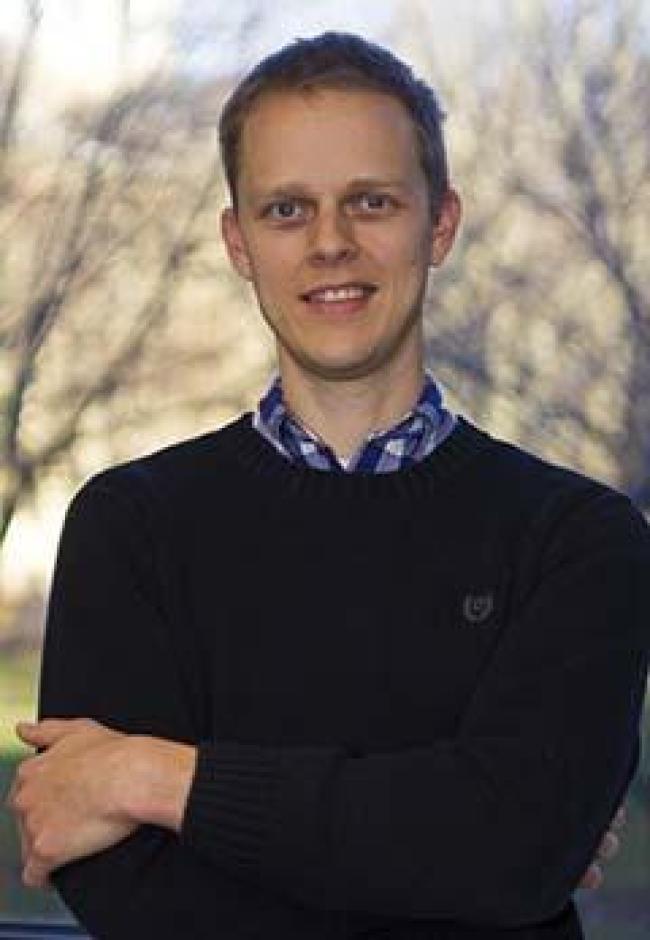Signals from the Universe
Program dates: check-in June 21, class June 22-25, 2020
Program cost: $680
Includes lodging, all meals and any field trips. Students arrive on campus Sunday, June 21, and depart Tuesday, June 23.
Course description
Instructor: Dr. William Peterson
The universe speaks to us all the time, not just with visible light but also radio! Radio telescopes detect the natural radio emissions from stars, galaxies, nebulas, and even planets, which tells us things about these objects that visible light telescopes can't, and can even be used to make more detailed images of farther objects than is possible with any other instrument!
Students will learn about electromagnetic waves, astronomy, and circuit design, and will build their own simple radio receiver that can measure radio emission from Earth's ionosphere, which they can keep and use to participate in global research efforts.
We will use Augustana's radio telescope to detect radio emission from the Sun, and will visit the nearby VLBA telescope in North Liberty, Iowa - an element of a globe-spanning array of radio sensors that forms an Earth-sized telescope for observing the universe.
Tentative schedule
Day 1
- 9 a.m.
- Introductions, electromagnetic waves
- 9:30 a.m.
- Lab time — waves on string, em waves
- 10:45 a.m.
- Break
- 11 a.m.
- Lab time — how a radio works, LC circuit
- Noon
- Lunch with faculty and research students
- 1 p.m.
- Tour of Hanson Hall of Science with summer research students
- 1:30 p.m.
- Radio Jove receiver theory, set up radio telescope
- 2 p.m.
- Lab time — intro to building circuits
- 3 p.m.
- Break
- 3:15 p.m.
- Lab time — antenna design
- 4:30 p.m.
- Radio Jove telescope tear down
- 5 p.m.
- Dinner
- 9 p.m.
- Planetarium and Observatory tour and night sky observing
Day 2
- 9 a.m.
- Intro to Radio Astronomy
- 9:30 a.m.
- Set up Radio Jove telescope
- 10:30 a.m.
- Break
- 10:45 a.m.
- Lab time — build a radio receiver
- Noon
- Lunch with faculty and research students
- 1 p.m.
- Talk — Radio Astrophysics
- 1:30 p.m.
- Lab time — enhanced radio receiver, antenna experimentation
- 3 p.m.
- Break
- 3:30 p.m.
- Lab time — testing, reflection and discussion
- 4:30 p.m.
- Radio Jove telescope teardown
- 5 p.m.
- Dinner
- 9 p.m.
- Rain date night sky observing
Day 3
- 9 a.m.
- Set up Radio Jove telescope
- 9:15 a.m.
- Depart for North Library
- 10:30 a.m.
- Tour of Very Long Baseline Array (VLBA) Telescope
- Noon
- Bag lunch at Devonian Fossil Gorge
- 1:30 p.m.
- Return to Augustana
- 3 p.m.
- Radio Jove telescope teardown, analysis of data
- 4 p.m.
- Cryogenics (liquid nitrogen ice cream)
- 5 p.m.
- Closing session and meet with families
- 5:30 p.m.
- Depart from Augustana
Instructor: Dr. Bill Peterson

Dr. William Peterson earned a Ph.D. in physics from the University of Iowa and is an assistant professor at Augustana College. He teaches astronomy, electronics, acoustics, introductory physics courses, and designs physics labs at Augustana. He pursues research in astronomy and space physics, using internationally-based telescopes. He is the faculty mentor for the Astronomy club, hosts outreach activities related to astronomy and physics, and participates in the Quad Cities Co-Lab, a local makerspace.

